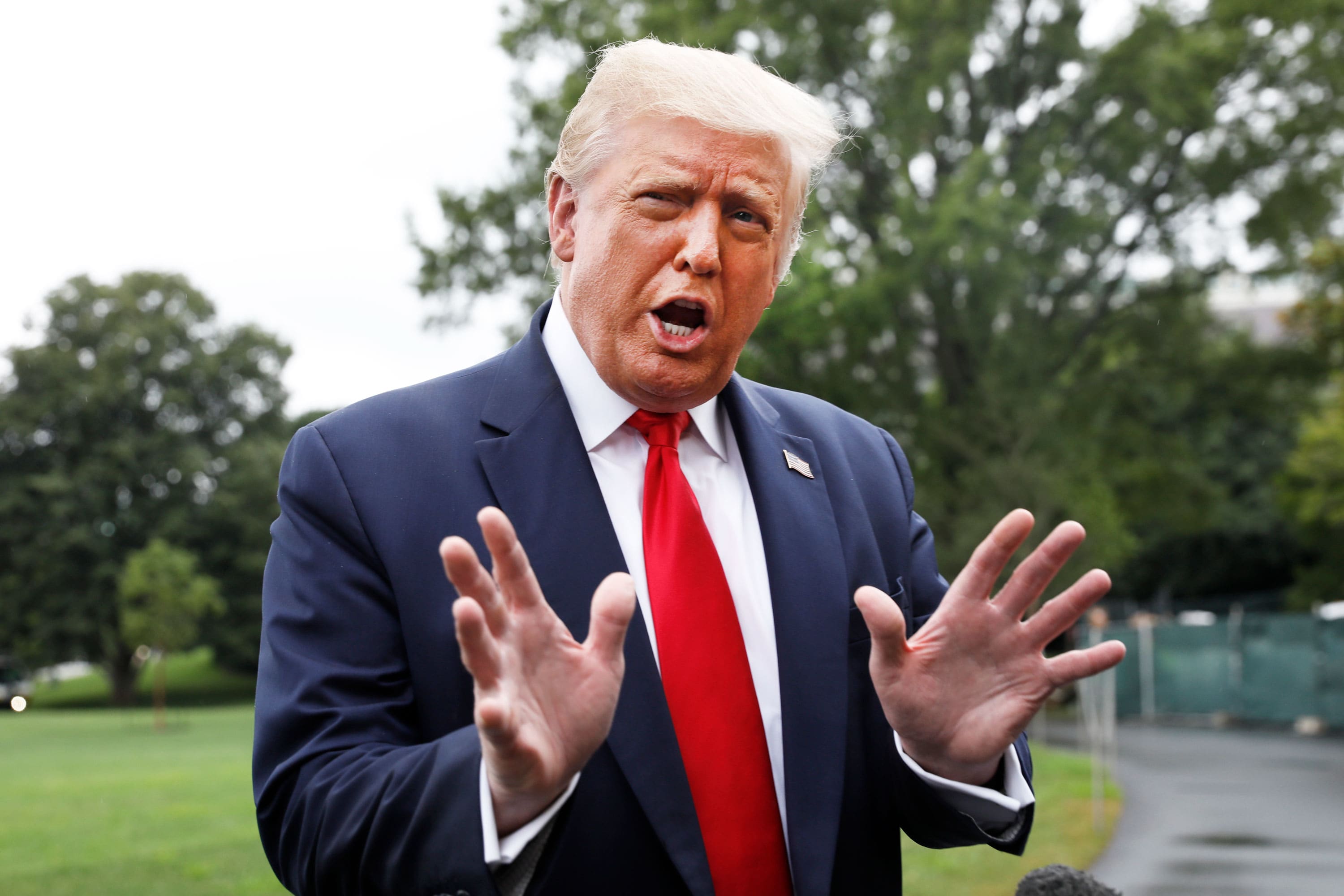President Donald Trump speaks to the media before boarding Marine One on the South Lawn of the White House on July 31.
Yuri Gripas | Abaca | Bloomberg | Getty Images
President Donald Trump might not have to wait for Congress to pass his payroll tax cut. He may be able to do it on his own.
Rather than waiting for lawmakers to come around to a payroll tax holiday, the president could order the Treasury Department to stop collecting the tax, according to an Aug. 2 op-ed in The Wall Street Journal.
The opinion piece was authored by Stephen Moore, a member of the president’s economic recovery task force, and Phil Kerpen, president of the Committee to Unleash Prosperity.
Payroll taxes are the slice of employees’ pay that’s withheld to fund Social Security and Medicare.
More from Personal Finance:
Small businesses rehire staff but cut pay and hours
Treasury canceling stimulus checks to dead recipients
Coronavirus unemployment claims are worst in history
The burden is shared by the worker and the employer: Each is responsible for a 6.2% levy that funds Social Security, plus a 1.45% tax that goes toward Medicare. While Social Security taxes are subject to a wage base limit of $137,700 in 2020, Medicare taxes continue to apply beyond that threshold.
To get the payroll tax break — a deferral, according to Moore and Kerpen — the Trump administration would employ a section of the tax code that allows the Treasury Secretary to postpone certain tax-related deadlines in a federally declared disaster.
Earlier this year, the administration used this same authority to delay the due date for 2019 federal income taxes.
“Mr. Trump should instruct the Treasury to stop withholding payroll taxes,” Moore and Kerpen wrote.
“The whole intention of this is that the next president, Biden or Trump, would forgive the tax payment,” Moore said in an interview with CNBC. “The whole purpose of suspending the tax, deferring it, is to get the money into the economy now.”
Though the move would technically be a deferral, Trump could pledge to sign a bill to forgive the repayments, Moore and Kerpen said in the op-ed.
“He does have the authority to postpone the collection of the payroll tax under the Internal Revenue Code,” said Michael Graetz, a professor of tax law at Columbia University and author of The Wolf at the Door: The Menace of Economic Insecurity and How to Fight It. “But it’s only the authority to postpone and not forgive.”
“He doesn’t have the authority to forgive the taxes,” said Graetz. “Only Congress can do that.”
Limited appetite in Congress
House Speaker Nancy Pelosi, D-Calif., and Senate Majority Leader Mitch McConnell, R-Ky., at the U.S. Capitol to honor late Rep. John Lewis, D-Ga., in Washington, D.C., on July 29.
Brendan Smialowski | AFP | Bloomberg via Getty Images
Lawmakers were able to hammer out payroll tax breaks for employers in the CARES Act this spring.
For instance, employers can defer the deposit and payment of their share of Social Security taxes from March 27 through Dec. 31. They must pay 50% of the liability by the end of 2021 and the remainder by Dec. 31, 2022.
On both sides of the aisle, Congress has been less receptive toward suspending the payroll tax for employees — even as Trump has advocated for it.
Supporters of a payroll tax holiday for employees argue that it would allow workers to take home more money and spur economic growth through spending.
Research suggests the poorest employees would get the least amount of benefit, however.
The poorest 20% of people — those with income below $24,200 — would see their taxes fall by an average of $250, according to the Institute on Taxation and Economic Policy.
The president could skew the benefit away from the highest income earners, Moore and Kerpen said.
“Mr. Trump could cap it at, say, $75,000 of income, so the vast majority of the benefit would go straight into the wallets of middle- and lower-income workers, almost all of whom pay more payroll than income tax,” they wrote.
Uncertainty for business owners
Policy experts warn that jittery employers might be reluctant to let employees pocket the savings from a payroll tax deferral.
Forgiveness may not be guaranteed, and firms know they’ll have to cough up those taxes at some point or else face penalties and interest.
Business owners who fail to remit employees’ share of taxes altogether could face personal liability, said Garrett Watson, senior policy analyst at the Tax Foundation.
“There’s a reason why we don’t go to the employee payroll side tax for deferral,” he said. “That’s because there are more stringent guardrails and penalties for not paying those taxes.”
In that case, a firm might merely save the deferred taxes instead of putting the money to use or giving it to workers.
“If employers have all of this liability that’s been deferred, they have a real issue of paying it if they spend the money instead of putting it aside,” said Graetz. “A cautious employer would set it aside in an account on the assumption they’ll have to pay it later.”
If such a payroll tax break were enacted, Trump could tell employers that the money should go to the employees, Moore said.
“Trump could say to employers that we want this money returned to the workers,” said Moore in an interview with CNBC. “If you had this tax cut and people didn’t give the money back to the workers, they’re going to get pretty upset.”
